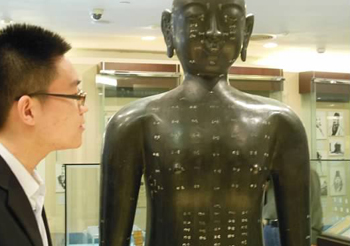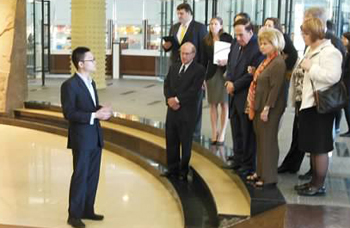SHANGHAI — Traditional Chinese Medicine has a role to play in modern medicine, according to participants of a meeting of the Association of Academic Health Centers International.
 |
A tour guide at the museum of the University of Traditional Chinese Medicine in Shanghai explains the use of a model for acupuncture study. Before students are tested on their knowledge of acupuncture points, the holes in the model are obscured, and the model is filled with water. When the student correctly places the acupuncture needle, the water is released. |
About TCM
Traditional Chinese Medicine (TCM) includes accupuncture, herbal remedies and medical massage.
“This medicine isn’t just for China but for all civilization,” said Dr. Pei Gang, Tongji University president. “China is a special society to keep both (traditional and modern medicine).”
The dream, he said, is that TCM and modern medicine will become one. In China, TCM now is a medical specialty, similar to specialties in the U.S., and doctors of modern medicine and TCM refer patients to each other.
Prevention minded
TCM includes a focus on disease prevention and wellness. Dr. Gang said that’s important because of the prevalence of lifestyle-related diseases.
During a tour of the TCM museum, a guide compared treating disease to digging a well.
“If you wait until the disease is present, it’s like waiting to dig a well until you are thirsty. It’s too late.”
A powerful form of medicine
Steven Wartman, M.D., the AAHCI’s president and chief executive, said he was convinced 30 years ago of TCM’s powerful potential after he observed a surgery in which the patient was kept under anesthesia by accupuncture for the removal of part of a lung.
 |
TCM museum tour: UNMC Chancellor Harold M. Maurer and his wife, Beverly, take part in a tour of the University of Traditional Chinese Medicine museum in Shanghai. To Dr. Maurer’s right is Steve Wartman, M.D., president and chief executive of the Association of Academic Health Centers International. |
Potential opportunities
Accupuncture has a growing acceptance around the world, especially for pain management and treatment of some conditions, such as Bell’s Palsy, said UNMC Chancellor Harold M. Maurer, M.D. Herbal remedies, though, hold the most potential for western medicine because they offer drug discovery opportunities, he said.
“We would like to see what herbal medicines’ key chemicals are and whether we can develop western medicine drugs from them,” Dr. Maurer said.
After the meeting, Dr. Maurer invited a cancer researcher from Shanghai Traditional Chinese Medicine University to speak at UNMC.